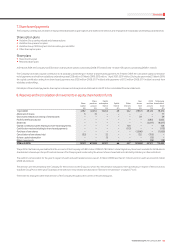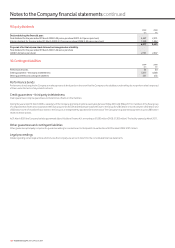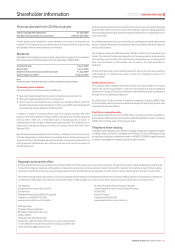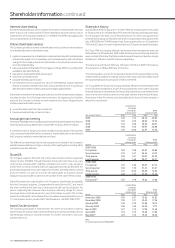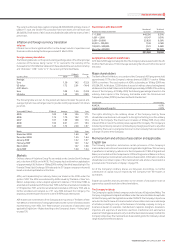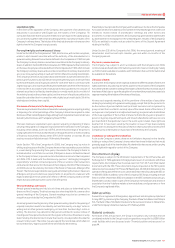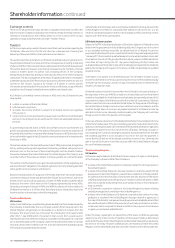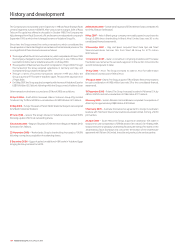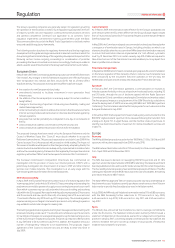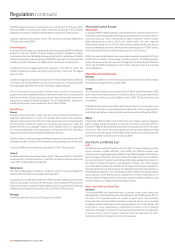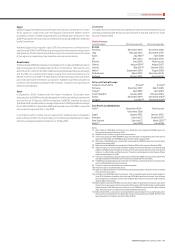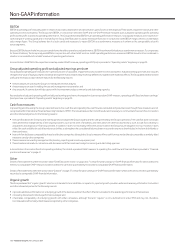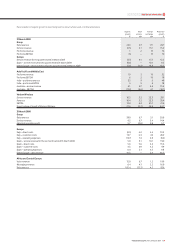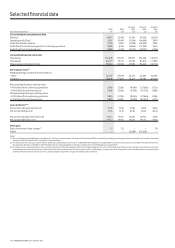Vodafone 2009 Annual Report Download - page 137
Download and view the complete annual report
Please find page 137 of the 2009 Vodafone annual report below. You can navigate through the pages in the report by either clicking on the pages listed below, or by using the keyword search tool below to find specific information within the annual report.
Vodafone Group Plc Annual Report 2009 135
Additional information
The Group’s operating companies are generally subject to regulation governing
the operation of their business activities. Such regulation typically takes the form
of industry specific law and regulation covering telecommunications services
and general competition (antitrust) law applicable to all activities. Some
regulation implements commitments made by governments under the Basic
Telecommunications Accord of the World Trade Organisation to facilitate market
entry and establish regulatory frameworks.
The following section describes the regulatory framework and the key regulatory
developments at the global and regional level and in selected countries in which the
Group has significant interests. Many of the regulatory developments reported in the
following section involve ongoing proceedings or consideration of potential
proceedings that have not reached a conclusion. Accordingly, the Group is unable to
attach a specific level of financial risk to the Group’s performance from such matters.
European Union
In November 2007, the Commission published proposals to amend the EU framework
(‘the review’). Any changes to the EU framework would become effective following
their transposition into national law from around 2010. Not all of these affect
Vodafone directly. The proposals that may directly affect Vodafone include:
the creation of a new European advisory body;•
amendments intended to facilitate investment in next generation fixed •
infrastructure;
the addition of functional separation as a remedy subject to certain conditions •
being fulfilled;
changes to the licensing of spectrum, introducing more flexibility, trading and •
market-based approaches;
some ‘net neutrality’ provisions to address the concerns that the services of some •
internet service providers will be blocked or otherwise discriminated against by
network operators;
proposals that number portability be completed in one day on all networks in •
the EU;
various measures to address concerns about network security; and•
various measures to address the provision of services for the disabled.•
The proposed changes have been voted on by the European Parliament and the
Council of Member States (the ‘Council’) must decide whether to accept the
Parliament’s amendments. This process is expected to conclude in June 2009 if the
Council accepts. If not, the proposals will proceed to a third reading. The impact of
the review on Vodafone will depend on the changes actually adopted by the EU, the
manner in which revised directives are subsequently implemented in member states
and how the revised regulatory framework is then applied by the respective national
regulatory authorities (‘NRAs’) and the European Commission (the ‘Commission’).
The European Commission’s Competition Directorate has commenced an
investigation into the provision of voice over internet protocol (‘VOIP’), with a
preliminary investigation into the provision of access to VOIP and other internet
services over mobile networks. This investigation is at an early stage with the
Commission gathering information from interested parties.
International roaming
In April 2009, the European Parliament voted in favour of a revised regulation (the
‘roaming regulation’) under Article 95 of the EU Treaty amending and extending the
requirements on mobile operators to supply voice roaming by means of a euro-tariff
(from which customers may opt out) under which the cost of making and receiving
calls within the EU is capped. New caps for making calls are proposed at 39 eurocents
and 35 eurocents and new caps for the costs of receiving calls of 15 eurocents and
11 eurocents effective July 2010 and July 2011, respectively. The revised regulation
requires roaming voice charges to be levied in per second units, although operators
may establish certain initial charges for making calls.
The roaming regulations also regulates roaming text messages and data roaming with
proposals including a retail cap of 11 eurocents and a wholesale cap of 4 eurocents
on roaming text messages. An average wholesale price cap for data roaming services
of 100 eurocents per megabyte is proposed. This price cap reduces to 80 eurocents
in July 2010 and to 50 eurocents in July 2011. In addition, the regulation sets out a
number of transparency measures to be implemented. The proposals require
agreement of the Council to become law and are likely to enter into force in
July 2009.
Call termination
At 31 March 2009, the termination rates effective for the Group’s subsidiaries and
joint ventures within the EU, which differs from the Group’s Europe region, ranged
from 4.7 eurocents (4.3 pence) to 9.7 eurocents (9.0 pence), at the relevant 31 March
2009 exchange rate.
In May 2009, the Commission adopted a recommendation aimed at achieving further
convergence of termination rates in Europe, including principles on which cost
elements should be taken into account when NRAs determine termination rates and
to ensure that termination rates are implemented at a “cost efficient, symmetric
level” by 31 December 2012 or in certain cases by July 2014. NRAs are required to
take utmost account of the Commission’s recommendations, but may depart from
them in justified circumstances.
Fixed network regulation
In Se pte mber 2 00 8, t he C ommiss ion co nsulted up on p rop osal s fo r a reco mmen dat ion
on the future regulation of fibre networks. Plans to construct such networks have
been announced by the incumbent fixed line operators in the UK, Italy, the
Netherlands and Spain and are already well developed in France and Germany.
Spectrum
In February 2007, the Commission published a communication on its plans to
introduce greater flexibility in the use of spectrum in selected bands, including 2G
and 3G bands, through the use of decisions agreed with the Radio Spectrum
Committee (an EU level committee comprising the Commission and member states).
The first proposed measure is a replacement of the GSM Directive by a decision to
allow the deployment of UMTS services using 900 MHz and 1800 MHz spectrum
(‘refarming’). The Commission submitted formal proposals for such a decision to the
European Parliament in July 2007.
In November 2007, the European Commission made a policy announcement on the
800 MHz ‘digital dividend’ spectrum (to be released following the transition from
analogue to digital TV). It urged Europe, and the member states in particular, to
identify new harmonised bands of spectrum for mobile broadband services and
mobile TV.
Europe
Germany
The NRA published proposals to auction further 1800 MHz, 2.1 GHz, 2.6 GHz and UHF
spectrum, with auctions expected in late 2009 or early 2010.
The NRA reduced termination rates from 7.92 eurocents to 6.59 eurocents applicable
from 1 April 2009 until 30 November 2010.
Italy
The NRA has issued a decision on reassigning 900 MHz spectrum and 2.1 GHz
spectrum and on the implementation of 900 MHz refarming. The Italian Government
has now published a notice with a call for tender and auction for certain frequencies.
The four existing network operators have submitted expressions of interest. The offer
starting price has been set at €495.8 million, but in the case of no bidders, the starting
price will be reduced to €88.7 million.
The Italian NRA has approved Telecom Italia’s proposed voluntary undertakings on
fixed network access. Vodafone currently purchases certain services from Telecom
Italia in order to provide fixed broadband services in the Italian market.
In July 2008, the NRA reduced Vodafone’s termination rate by 11% to 8.85 eurocents,
with the NRA foreseeing further reductions to 7.70 eurocents in July 2009,
6.60 eurocents in July 2010, 5.30 eurocents in July 2011 and 4.50 eurocents in
July 2012.
Spain
The Ministry has announced that Vodafone has met its coverage commitments
under the 3G licence. The National Communication Authority (‘NCA’) issued a
statement of objections in the procedure opened for an alleged anti-competitive
practice in January 2007, concerning alleged concerted practice by Vodafone and
others to establish the same call set up charges. It has proposed a finding that
Vodafone was not liable for any breach.
Regulation


